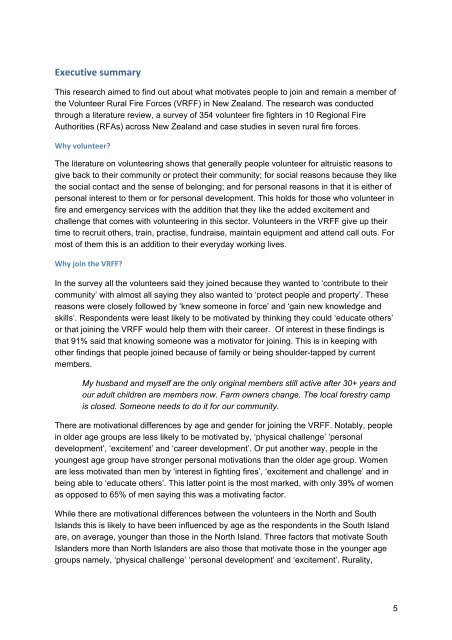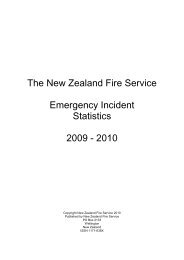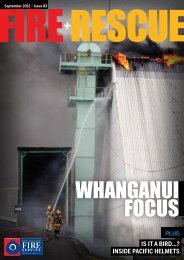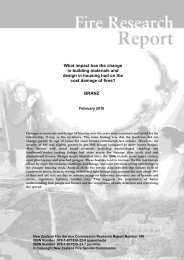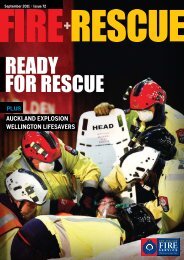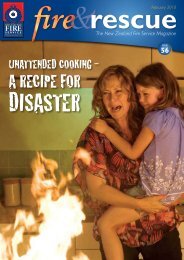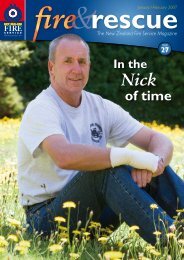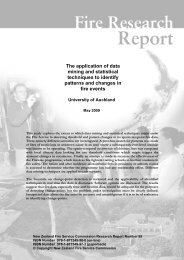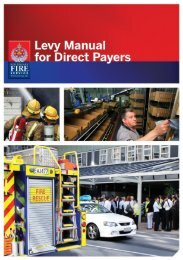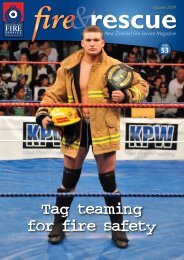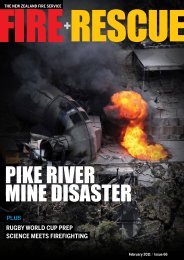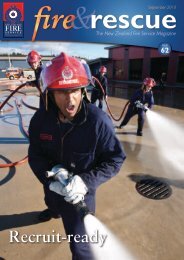What motivates people in small rural communities to become ...
What motivates people in small rural communities to become ...
What motivates people in small rural communities to become ...
Create successful ePaper yourself
Turn your PDF publications into a flip-book with our unique Google optimized e-Paper software.
Executive summary <br />
This research aimed <strong>to</strong> f<strong>in</strong>d out about what <strong>motivates</strong> <strong>people</strong> <strong>to</strong> jo<strong>in</strong> and rema<strong>in</strong> a member of<br />
the Volunteer Rural Fire Forces (VRFF) <strong>in</strong> New Zealand. The research was conducted<br />
through a literature review, a survey of 354 volunteer fire fighters <strong>in</strong> 10 Regional Fire<br />
Authorities (RFAs) across New Zealand and case studies <strong>in</strong> seven <strong>rural</strong> fire forces.<br />
Why volunteer? <br />
The literature on volunteer<strong>in</strong>g shows that generally <strong>people</strong> volunteer for altruistic reasons <strong>to</strong><br />
give back <strong>to</strong> their community or protect their community; for social reasons because they like<br />
the social contact and the sense of belong<strong>in</strong>g; and for personal reasons <strong>in</strong> that it is either of<br />
personal <strong>in</strong>terest <strong>to</strong> them or for personal development. This holds for those who volunteer <strong>in</strong><br />
fire and emergency services with the addition that they like the added excitement and<br />
challenge that comes with volunteer<strong>in</strong>g <strong>in</strong> this sec<strong>to</strong>r. Volunteers <strong>in</strong> the VRFF give up their<br />
time <strong>to</strong> recruit others, tra<strong>in</strong>, practise, fundraise, ma<strong>in</strong>ta<strong>in</strong> equipment and attend call outs. For<br />
most of them this is an addition <strong>to</strong> their everyday work<strong>in</strong>g lives.<br />
Why jo<strong>in</strong> the VRFF? <br />
In the survey all the volunteers said they jo<strong>in</strong>ed because they wanted <strong>to</strong> ‘contribute <strong>to</strong> their<br />
community’ with almost all say<strong>in</strong>g they also wanted <strong>to</strong> ‘protect <strong>people</strong> and property’. These<br />
reasons were closely followed by ‘knew someone <strong>in</strong> force’ and ‘ga<strong>in</strong> new knowledge and<br />
skills’. Respondents were least likely <strong>to</strong> be motivated by th<strong>in</strong>k<strong>in</strong>g they could ‘educate others’<br />
or that jo<strong>in</strong><strong>in</strong>g the VRFF would help them with their career. Of <strong>in</strong>terest <strong>in</strong> these f<strong>in</strong>d<strong>in</strong>gs is<br />
that 91% said that know<strong>in</strong>g someone was a motiva<strong>to</strong>r for jo<strong>in</strong><strong>in</strong>g. This is <strong>in</strong> keep<strong>in</strong>g with<br />
other f<strong>in</strong>d<strong>in</strong>gs that <strong>people</strong> jo<strong>in</strong>ed because of family or be<strong>in</strong>g shoulder-tapped by current<br />
members.<br />
My husband and myself are the only orig<strong>in</strong>al members still active after 30+ years and<br />
our adult children are members now. Farm owners change. The local forestry camp<br />
is closed. Someone needs <strong>to</strong> do it for our community.<br />
There are motivational differences by age and gender for jo<strong>in</strong><strong>in</strong>g the VRFF. Notably, <strong>people</strong><br />
<strong>in</strong> older age groups are less likely <strong>to</strong> be motivated by, ‘physical challenge’ ‘personal<br />
development’, ‘excitement’ and ‘career development’. Or put another way, <strong>people</strong> <strong>in</strong> the<br />
youngest age group have stronger personal motivations than the older age group. Women<br />
are less motivated than men by ‘<strong>in</strong>terest <strong>in</strong> fight<strong>in</strong>g fires’, ‘excitement and challenge’ and <strong>in</strong><br />
be<strong>in</strong>g able <strong>to</strong> ‘educate others’. This latter po<strong>in</strong>t is the most marked, with only 39% of women<br />
as opposed <strong>to</strong> 65% of men say<strong>in</strong>g this was a motivat<strong>in</strong>g fac<strong>to</strong>r.<br />
While there are motivational differences between the volunteers <strong>in</strong> the North and South<br />
Islands this is likely <strong>to</strong> have been <strong>in</strong>fluenced by age as the respondents <strong>in</strong> the South Island<br />
are, on average, younger than those <strong>in</strong> the North Island. Three fac<strong>to</strong>rs that motivate South<br />
Islanders more than North Islanders are also those that motivate those <strong>in</strong> the younger age<br />
groups namely, ‘physical challenge’ ‘personal development’ and ‘excitement’. Rurality,<br />
5


